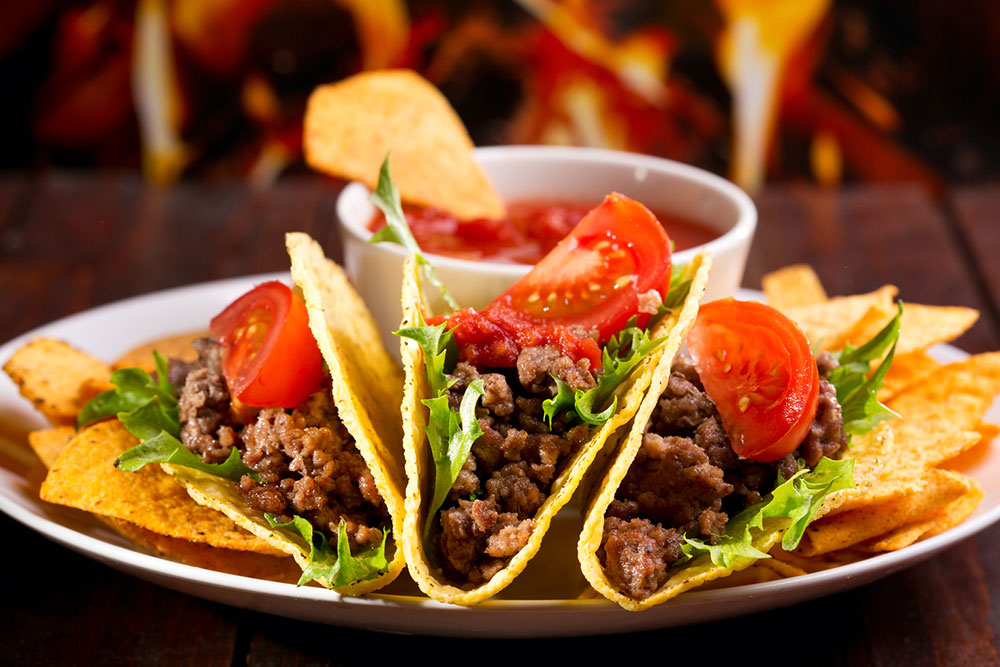
8 foods that weaken bones and worsen osteoporosis
Bone health is a surprisingly overlooked aspect of many individuals’ wellness routines. Bone care should be a priority because bones support the body, enable movement, and protect the organs from harm. Unlike in the case of some conditions, one does not need a complex exercise routine for bone health; what’s required is proper nutrition. However, certain foods can make the bones weaker and leave people vulnerable to osteoporosis. Here are eight such foods to note.
Tacos
Tacos tend to have a lot of salt and spices, and salt contains sodium and chloride. Sodium is an essential nutritional element, but consuming too much of it makes the bones brittle with time. Both sodium and chloride contribute to the collective breakdown of one’s bones through the erosion of calcium from them and, over some time, also contribute to the skewing of the blood’s overall pH level. Some of the foods that contain an abundance of sodium and salt are bread and rolls, pizzas, sandwiches, soups, burritos, tacos, chicken, lunch meat, cheese, pretzels, and eggs.
Hamburgers
Several studies have found that both low-fat and high-fat foods can increase a person’s chances of developing osteoporosis or worsening the condition if they already have it. Red meat, especially, is known to make bones brittle and prone to damage and long-lasting injuries. Red meats such as beef, pork, and lamb are extremely high in saturated omega-6 polyunsaturated fatty acids. These fatty acids not only leave people vulnerable to osteoporotic fractures, but also a range of cardiovascular issues. Hot dogs, bacon, hamburgers, and sausages are made using red meat and contain polyunsaturated fats. They are, thus, foods that weaken the bones and help worsen osteoporosis.
Carbonated sodas
Excess consumption of fizzy drinks, such as carbonated sodas, is typically responsible for a whole host of health problems in people. These drinks adversely affect most systems in the body, from the circulatory system to the digestive system to a person’s cardiovascular system. Unsurprisingly, carbonated sodas also speed up the development of osteoporosis. These drinks contain phosphoric acid, an element that causes an imbalance of calcium in one’s bones. Additionally, the caffeine content in some energy drinks and sodas tends to reduce bone density in people, especially women.
Hydrogenated oils
Vitamin K is an essential element needed for strong bones, and vegetable oils such as olive oil and canola oil are rich sources of it. However, to cut costs, several food companies favor hydrogenation. The process of hydrogenation turns liquid vegetable oil into solid oils and destroys the naturally occurring vitamin K in these oils. Since green leafy vegetables are also rich in vitamin K, people can consume spinach, kale, collard greens, and Swiss chard.
Cakes and pastries
Sugary foods are also known to be bad for one’s bones, and refined sugars are directly associated with progressively worsening bone health. Many studies have found that foods like cakes, pastries, artificially sweetened dessert snacks, fruit juices, energy drinks, sodas, sweetened teas, and coffees and candies undermine bone strength and leave the bones vulnerable to conditions like osteoporosis.
Ideally, one must avoid such foods altogether. If that is not possible, then one should try to consume as little of such foods as possible. For example, eating a piece of cake once in a while is alright; however, if one is at risk of osteoporosis or has the condition, it is advisable to consult a healthcare professional or a nutritionist to ensure the consumption of sweets won’t adversely affect one’s health.
Coffee
Caffeine is one of the worst things when it comes to bone health. For many people, the day does not start before having a freshly brewed cup of coffee. However, people who are serious about keeping their bones healthy need to give up caffeine-heavy drinks like tea and coffee altogether or consume them in moderation. Caffeine prevents calcium absorption, meaning the bones cannot use the element even if one has sufficient calcium. According to some studies, about 6 milligrams of calcium are lost from one’s bones for every 100 milligrams of caffeine they ingest. If a person consumes tea and coffee regularly, then they are likelier to have brittle and porous bones in the long run.
Legumes
A surprising entry on this list is the nutrient-filled and delectable legumes. Beans like legumes, pinto beans, peas, and navy beans are high in substances called phylates. Phylates interfere with the body’s ability to absorb calcium from any given food. Therefore, if one consumes legumes in excess amount, then they are likely to have bone density issues.
Eggs
Foods rich in vitamin A, including eggs, full-fat dairy products, and liver, are great for one’s vision but can cause bone fractures and overall weakening of one’s skeletal frame. Bone weakening is a problem associated with vitamin A-heavy foods. Instead of eating whole eggs, one can switch to having egg whites. Additionally, one can check their multivitamin-based prescription solutions if they contain too much vitamin A. If they do, then one can consider modifying or stopping the prescription after consulting with their healthcare expert or nutritionist. Some of the other “bad” foods for the bones are wheat bran, rhubarb, whole grains, kidney beans, lentils, and garbanzo beans. In the long term, these foods can weaken the bones and worsen conditions like osteoporosis.


